#;I Write Sins Not Tragedies (main)
Explore tagged Tumblr posts
Text
Im so mad my book isn't published and I can't nurish myself on the broken hearts of readers being tricked by the false allure of found family. How sick !! Let me drink those tears of anguish !! Let me cause misery plssss 😩😩
#just to be clear misery is not my main objective when writing#its just a very sweet added bonus#and genuinely makes me giddy with joy thinking about#like yes !!!! make people fall in love with the idea of healing through the friendship and love of a father figure#then let said father figure be just as horrible as the original father !!! the sin and tragedy repeats itself !!! the cycle never ends#not until all fathers die can the daughter start to heal on her own#hallelujah!!!#but also people will be so pissed lmao YESS#i cant wait fr !!!! 😭😭😭😭😭#writing
6 notes
·
View notes
Text
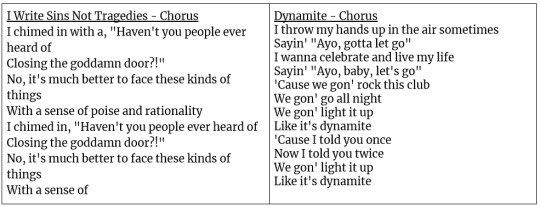
fun facts
the song title "I Write Sins Not Tragedies" was inspired by a line in Douglas Coupland's novel Shampoo Planet. In it, the main character says "I am writing a list of tragic character flaws on my dollar bills with a felt pen. I am thinking of the people in my universe and distilling for each of these people the one flaw in their character that will be their downfall – the flaw that will be their undoing. What I write are not sins; I write tragedies"
songwriter Benny McKee explained that Dynamite "wasn’t meant to be a straight-up party song. It was meant to be a surrender song. “I throw my hand up in the air sometimes” is when you don’t get your way – when you give up and you’re handing it over. So it’s really a song about surrender that I wrote when I was starting to get sober. It’s funny that it just turned into a straight-up club banger. There was really a lot of heart and ton of spirituality underneath it"
4K notes
·
View notes
Text
1st house synastry playlist
mirrored vibes - 1st house synastry (playlist) / outer planets / asteroids
for when their sun is in your first house:
"can't smile without you" - carpenters / "lean on me" - bill withers / "i wanna dance with somebody (who loves me)" - whitney houston / "halo" - beyonce / "let it be" - the beatles /
for when your sun is in their first house:
"count on me" - bruno mars / "a sky full of stars" - coldplay / "signed, sealed, delivered (i'm yours)" - stevie wonder / "better together" - jack johnson / "i'm your man" - leonard cohen /
for when their moon is in your first house:
"hallelujah" - leonard cohen / "fix you" - coldplay / "what a wonderful world" - louis armstrong / "can't help falling in love" - elvis presley / "i see your true colors" - cyndi lauper /
for when your moon is in their first house:
"how you remind me" - nickelback / "vulnerable" - selena gomez / "my heart will go on" - celine dion / "you've got a friend in me" - randy newman / "i'm gonna be (500 miles)" - the proclaimers /
for when their mercury is in your first house:
"thinking out loud" - ed sheeran / "mr. blue sky" - electric light orchestra / "let's go crazy" - prince / "thinking of you" - katy perry / "hey jude" - the beatles /
for when your mercury is in their first house:
"teach your children" - crosby, stills, nash, & young / "keep talking" - pink floyd / "rhapsody in blue" - george gershwin / "i write sins not tragedies" - panic! at the disco / "hey ya!" - outkast /
for when their venus is in your first house:
"crazy in love" - beyonce (feat. jay-z) / "a thousand years" - christina perri / "make you feel my love" - adele / "perfect" - ed sheeran / "you're so beautiful" - joe cocker /
for when your venus is in their first house:
"you're the one that i want" - grease / "this must be the place (naive melody)" - talking heads / "you've got the love" - florence + the machine / "mirrors" - justin timberlake / "because you loved me" - celine dion /
for when their mars is in your first house:
"livin' on a prayer" - bon jovi / "we will rock you" - queen / "eye of the tiger" - survivor / "titanium" - david guetta (feat. sia) / "fighter" - christina aguilera /
for when your mars is in their first house:
"war" - edwin starr / "bad to the bone" - george thorogood & the destroyers / "danger zone" - kenny loggins / "you shook me all night long" - ac/dc / "lose yourself" - eminem /
@pearlprincess02
main masterlist
#1st house synastry#synastry overlays#synastry#my playlist#spotify playlist#astrology#astro notes#astro observations#astro community#astrology observations#astro tumblr#astrology notes#astroblr#astrology compatibility#1st house
314 notes
·
View notes
Text
So, it's the last days and a weird-looking guy called John is yelling about the end of the world.
AKA, it's Advent and we've reached the stage of Alectopause where I'm apparently writing Bible studies for the weird goth teens that hang out in graveyards... So let's talk about portentious guys called John and why a nun might have joined a necromancy cult.
Anyway, you know Advent, the cheerful and cozy time when we all think about cute baby Jesus as we get ready for Christmas, right?
WRONG
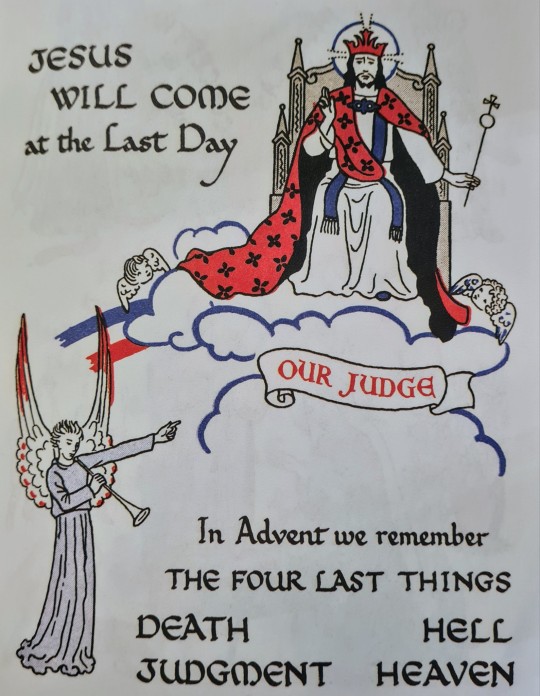
It's currently the second Sunday of Advent, and in lots of churches that follow the liturgical year, people will have been hearing about John the Baptist today (Me: "John". My phone: "Gaius?". Me: "John the-". My phone: "Necromancer?").
Without going into too much detail, John the Baptist is important because he's a prophet that points to the coming of Jesus. He first does this rather impressively in utero, but is probably best known for wandering the wilderness wearing camel hide and eating locusts, shouting about how the end is nigh and, hence the name, baptising people to cleanse them from their sins. People are pretty impressed by all this and start asking him if he is the promised messiah or one of the great prophets come again. He answers no, his job is to point towards one greater than him. He baptises Jesus, the heavens open, and not long afterwards John annoys the authorities and ends up with his head on an ornamental platter.
Now John the Baptist obviously isn't the main Biblical John evoked by John Gaius. That dubious honour probably goes to the beloved disciple John the Apostle, also known for The Gospel According To and The Apocalypse Of, aka the Book of Revelation, the Bible's account of the end of the world.
But John the Baptist (no, autocorrect, not "John the Necromancer") is relevant too, and not just because he's a guy called John, chosen by a higher power to lay the groundwork for better things to come and who falls afoul of the authorities with dramatic consequences.
Let's cycle back round to Advent for a moment. The reason Advent can both be aww cute little baby Jesus and also WHERE ARE YOU GOING WHEN YOU DIE?! is because in Christian theology, Jesus' birth and the end of the world are linked: the first and the second coming of Christ.
In Nona The Ninth, we learn that John and his friends are living in a world on the edge. Without some incredible plan - the cryo ships, the promise of FTL - everyone is going to die. Humanity has rendered the world uninhabitable. Although we get very few details of the broader geopolitical situation, we have to assume it's one rife with natural disasters and conflict.
In the Bible, Jesus talks about a world with famines and earthquakes, wars and rumours of wars, where to find yourself in those days with children would be a tragedy and to be pregnant even worse (maternity problem, anyone?). Specifically, this is when he talks about the signs of the end of the world and his second coming.
So what about M-'s nun? The first time we meet her is when she's advising John against his all-day Jesus Christ Superstar healing ministry.

And John's anxiety about meeting her is pretty apt. He says: "I was worried I was going to get the Antichrist bit from her too". Note the "too" - by this point, John has already been accused of being the Antichrist. Why? Because alongside those rumours of wars and earthquakes, Jesus gives another sign to watch out for: false prophets.
But M-'s nun saw John and his powers and - for reasons we never learn - believed they were miraculous, a gift from God. She appealed to the Vatican to investigate and recognise this. And her presence and this campaign apparently made a significant impact in reducing some of the issues they were facing. Somehow, she met awful, smarmy John and his corpse buddies and thought she was seeing the hand of God miraculously at work in the last days.
This bears repeating, because I've seen suggestions that she believed he was God, or was somehow converted to the cause of necromancy, but at least by John's narrative it's much simpler than that: right to the end she's praying for him in very Catholic terms to find clarity in his purpose.
This is the last we see of her:
She just smiled at me. She said, John, don’t misunderstand. I want to help you. I truly believe that in our most terrible hours we don’t instinctively reach out to God; we push ourselves away from Him. Don’t feel bad for not rising heroically to the occasion right now. Fear doesn’t help us achieve a state of grace; it deafens the heart. John, I truly believe you can save everyone. So concentrate, please. She said, Holy Mary, Mother of God, pray for us sinners, now and at the hour of our death. And she shot herself.
While obviously you are probably not walking a straightforwardly orthodox path if you're shooting yourself to help the leader of a self-proclaimed necromancy cult locate the soul, her language here is very focused on the Catholic understanding of sin and death. A "state of grace" refers to the condition of your soul when it's not burdened with serious sins. It's the state you're in after you're baptised or after you've been to confession. Being in a state of grace is one's soul being on a wavelength with God; it's the necessary state to enter heaven.
And the Hail Mary? Catholics believe that Mary has the power to intercede for them with God. And the most important moment at which she could intercede would be at the point of death where the state of your soul determines your eternal destination. This isn't a wacky necromancy cultist talking. I suspect she sees this less as a suicide (which the Catholic Church has historically not had the most nuanced views on...) than a fulfilment of Jesus' teaching to keep his commandments and that there is no greater love than to lay down your life for your friends.
We're not privy to exactly what she thought, and I don't think anyone's suggesting her approach was entirely orthodox, but if he's not the Second Coming, and he's not the Antichrist, and there are wars and rumours of wars and floods and earthquakes...did she see him as a prophet of the apocalypse? A sort of John the Baptist of the end times, who in demonstrating the reality of the soul would bring people to Christ before He came again?
Unfortunately for M-'s nun, John was not what she fervently believed him to be. And unlike John the Baptist, who said no when asked if he was something he was not, John used M-'s nun's death as a springboard to claim the trappings of both divinity and Catholicism for himself.
Unfortunately for John, judgement is coming in the form of an angry teenager Harrowing Hell and the very power he usurped, armed with a very big sword.
259 notes
·
View notes
Text
(Here is an essay I wrote about Edgar Allan Poe’s short story, “The Black Cat.” The essay delves into the seeming “mask of self delusion” that the narrator wears as he writes to exonerate himself of his crimes. To make it more interesting, I argue that the reader is obsolete to the story itself. The essay is really long, but I thought it was fun to write. Please let me know what you think of the topic—I am curious to hear others’ thoughts!)
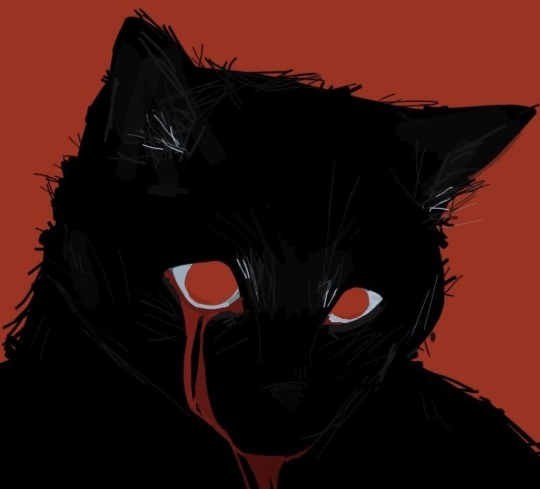
The Mask of Self-Delusion
(Jack C. June, 2024)
Edgar Allan Poe’s narrator in his short story, “The Black Cat,” is delusional. No reader would bat an eye at this claim, as that is very plainly the case upon even an elementary reading of the work. And yet, the reader is not a crucial part of the reading process itself. On the contrary, Poe’s narrator does not require a reader at all. Instead, the narrator is writing solely for himself. The unreliable narrator in Poe’s short story attempts to exonerate himself—to exculpate himself—in a confessional manner. From the very first lines, the reader becomes aware that they are not expected to believe the narrator, and because of this, the reader is not necessary in the first place. Instead, it is the narrator writing his story for himself in an attempt to justify and rationalize his vile actions—trying to clear away his wicked sins by claiming possession and demonic intervention. The themes of acting on evil human impulse and attempting to vindicate oneself through delusion are highlighted in Poe’s short story—allowing the reader to see that the devil is not necessary to perform vicious deeds—humans alone are just as capable.
It is evident from the first sentence that the narrator is not writing for an audience but for himself. The sentence reads, “For the most wild, yet homely narrative which I am about to pen, I neither expect nor solicit belief” (1). The reader is informed a moment later that the narrator is writing from a prison cell, and will die tomorrow, but first he wants to, “…unburthen [his] soul” (1). The narrator does not think anyone will believe him, but that does not matter to him. The narrator aims to assuage himself of the events that took place to convince himself that his actions were not entirely his own. This delusion becomes evident by the language used further in the first paragraph. For example, the narrator writes, “Yet, mad am I not…”, referring to the murders as a, “…series of mere household events”, and even going as far as to proclaim the events as, “…nothing more than an ordinary succession of very natural causes and effects” (1). The language is obviously filled with delusion, but the primary factor to take into account is the attempt at rationalizing his demonic behavior. The language may even remind readers of a defense attorney trying to subdue a tragedy at hand. The key word Poe uses to show the narrator’s attempted justification of his crimes is to describe them as “natural.”
As previously mentioned, this story does not require a reader. Whether or not anyone reads or believes the narrator is not the narrator’s main concern. Instead, the narrator only tries to convince himself of his innocence through delusion and self-manipulation. Scholars Vicki Hester and Emily Segir make an important point when they write, “The story cannot save him from the noose. He has no progeny and mentions no living relatives who might care about his guilt or innocence, so the story serves little purpose for the writer, leaving readers to wonder who might be the intended audience and what might be the story’s point” (176). The narrator is writing for himself—heightening his delusion in an effort to conceal himself from his wicked human nature. Therefore, it is vital that Poe chose to write his story in the first person and not the third. Had Poe written the story in the third person, readers would have been able to quickly identify that the narrator is unreliable. Similarly, the structure of the short story would lose its significance of being told as a confession had it been written in the third person. Poe cleverly chose to write “The Black Cat” in the first person to add to the obviousness of the narrator’s delusion, the vanquishing of pathos any reader may have for the narrator, and the glimpse into the psychologically disturbed that would have been lost otherwise.
This particular reading of the narrator attempting to vindicate himself is not a new interpretation. Scholar James Gorgano concurs with the specific reading of attempted self-exculpation, writing, “The narrator cannot understand that his assault upon another person derives from his own moral sickness and unbalance” (181). By accusing demonic entities and the supernatural, the narrator can step away from the blame he so clearly deserves. Gargano continues, writing, “Consequently, if his self-analysis is accepted, his responsibility for his evil life vanishes” (181). The narrator attempts to detach himself from his crimes by writing his story in his prison cell.
Further in the story, the narrator refers to being overcome by a demonic nature. Yet, he does little to consider that his “demonic nature” is actually innately human. One central theme for Poe is human nature being wicked at its core. Poe does not maintain the naïve belief of humans as innately good, but quite the opposite. Here, the narrator tries to trick himself into believing just that—that he is innocent and was influenced by outside powers. When the narrator kills his cat, he writes, “The fury of a demon instantly possessed me” (2). The narrator removes himself from the equation by casting blame on an evil force notorious for such a wicked crime. Further in the story, as the reader kills his wife, one sentence reads, “Goaded, by the interference, into a rage more than demonical, I withdrew my arm from her grasp and buried the axe in her brain” (6). The narrator has surpassed a demon's rage and arrived at the malicious doorstep of the devil’s capacity for wrath. The narrator cannot fathom that his human nature is not innately good and kind but devilish.
Finally, The narrator loses his grip on his sanity throughout the progression of the story. A few key indicators of the narrator becoming delusional have to do significantly with his language choice. Hester and Segir point out that, after the narrator kills his wife, “He now speaks of his wife as ‘it,’ ‘the body,’ ‘the corpse.’ He does not call his wife’s dead body an accident but refers to the death as, ‘the hideous murder accomplished’” (189). And again, there is a significant moment when the narrator casts his own blame onto otherworldly forces when discussing perverseness. These sentences read, “Yet I am not more sure that my soul lives, than I am that perverseness is one of the primitive impulses of the human heart—one of the indivisible primary faculties, or sentiments, which give direction to the character of Man” (2). The narrator craves to be absolved so intensely that he has no problem blaming his murders on human nature and demons—anyone but himself. Hester and Segir cleverly elaborate that, “He also suggests that we, readers, would all do the same, given the same circumstances” (179). A moment after the narrator blames perverseness, he writes, “Who has not, a hundred times, found himself committing a vile or a silly action, for no other reason than because he knows he should not?” (2). He carries on, speaking of his soul attempting to vex itself, committing, “…wrong for wrong’s sake only” (3). The narrator will do anything but look himself in the eye and confess that he, and he alone, is an evil man. The narrator would prefer to believe that all humans have a devil inside of them that may possess them at any moment and force them to commit heinous acts. It is easier to claim that, ‘the devil made me do it,’ than it is to look at one’s own blood-covered hands and have an epiphany of one’s Mephistophelian nature.
In the last paragraph, the narrator ceaselessly denies responsibility for his guilt. He writes, “Upon its head, with red extended mouth and solitary eye of fire, sat the hideous beast whose craft had seduced me into murder, and whose informing voice had consigned me to the hangman. I had walled the monster up within the tomb!” (8). He claims that Pluto had seduced him to kill instead of admitting that he did it of his own accord. What’s more, is that the narrator claims Pluto consigned him to the hangman—his impending death scheduled for the following day. The last line carries significant weight as the narrator directs—towards the cat—the word that should be used to describe himself—monster. On a deeper metaphorical level, this line can be read as the last act of attempted self-exculpation. With one last line, the narrator seals the guilt of his crimes within the wall. Maybe he was not referring to the cat as the monster, but the guilt of his crimes. The narrator of Edgar Allan Poe’s short story, “The Black Cat,” was never possessed by the devil, although he would prefer to think so. The narrator feels that if he can confess and convince himself of his innocence, he becomes blameless. Often, the devil is considered to be the root of all evil, but people forget that the first murder was a human killing a human—Cain killing Abel.
Works Cited
Gargano, James W. “The Question of Poe’s Narrators.” College English, vol. 25, no. 3, 1963, pp. 177–81. JSTOR.
Hester, Vicki, and Emily Segir. “Edgar Allan Poe: ‘The Black Cat,’ and Current Forensic Psychology.” The Edgar Allan Poe Review, vol. 15, no. 2, 2014, pp. 175–93. JSTOR.
Poe, Edgar Allan. “The Black Cat.” English ###: PDF File. The Black Cat.pdf, June, 2024.
#personal essay#college essay#essay#essay writing#my essays#edgar poe#edgar allan poe#Edgar Allan Poe the black cat#the black cat#black cat#cat#literary analysis#literary criticism#literature#american literature#gothic literature#goth#gothic#classic literature#literature major#literary quotes#study#research essay#english major#english literature#academia#uni#dark academia#chaotic academia#university
86 notes
·
View notes
Text
/ orv main story ending spoilers , mentions of kdj's suicidal mindset
mindless rambling
my friend who just finished orv asked me why kdj couldn't just split like 2% off of himself into an od avatar and leave that in the train while he joined kimcom, and while my initial reaction was "there's no way he could just do that" I remembered i thought a similar thing when I first read through orv too? and maybe it got explained down the line but I forget things real easy (which is why i'm rereading orv) and so I'm just trying to make sense of it using my existing knowledge
There's this bit in epilogue here:

Sangah's words "protecting the world by dividing himself in half, one becomes the reader, one becomes the character". the first being 51 and the second being 49,
I think there are layers to it. Right after being shaken by the OD ordeal, kdj's mindset that he's to blame for the whole world is reinforced stronger than ever before in his head, because he had just witnessed living proof of it. And that's not something he can overcome just because sp and 999 gang took od away to take care of him. Even then, kdj was confused why they weren't angry.
There's also the persisting mindset kdj has that he's twsa's reader and not a proper part of kimcom, and he probably felt like he should bear the burden of consciously continuing to read the world until the very end. He managed to see himself as part of kimcom over the course of the story but od's appearance sort of undoes all that progress he's ever made, and its sad but its pretty common for self hate mindsets to spiral like that,
He probably felt like he deserved it, yet him wanting that extra 2% difference to prove he knew and loved kimcom more than his avatar. Him regretting splitting in half right after the avatar left and he saw them all walking away. He knows what he wants and in the end he can't bring himself to think that he deserves it
And honestly I don't really know why the way singshong writes kdj's self hate and suicidal tendencies get me so badly, I mean I do, kind of, the feeling is there, but it's incredible how long the set up was and how real it feels when you see it all go downhill.
i think od reveal truly truly fucked up kdj to no repair. like if you read the passages, its fucking heartbreaking.
"My own tragedy couldn't even compare to their pain. The sin of creating an even bigger tragedy because of my own should not be forgiven." "Something was wrong. A blade… I, I needed to find a blade."
and the thing that gets to me is how easily anyone who has had self loathing thoughts can empathise with him. The want to disappear for inconveniencing things that would've been perfectly fine and pretty and happy had you not come into contact with it, the idea that you are a disgusting monster and its easier to shut yourself off than do any more damage. and its Fine if youre in pain because They will be happy and theyll will be happier without you.
It fascinates me how a portion of readers of orv who self blame or self doubt love kdj so much, because the act of loving him is also some form of self reassurance that they can be loved as well, because if someone like kdj can be forgiven, then surely they can, for all their small or big mistakes that are definitely not on the scale of plunging the universe into a space apocalypse. or something.
but i might be assuming so. don't take my word for any of this.
tldr he doesnt split out a small avatar to take the place of od because he thinks he deserves it. which is quite obvious if you take a look at the big picture, and i dont really know why i rambled so long. maybe ill reread orv and theres gona be a small bit that's like "ohh well actually if it was too small of a percentage that became od the universe wont hold up" and i will be like Ah yes i just missed that part. and this ramble will be void. uhh yes. have a nice day
164 notes
·
View notes
Text
So the JazzxProwl 2024 anniversary challenge is currently going on! Lasts until 10/06 11:59om CST!
We have a list of song lyrics as the main themes and some additional subjects as extra.
The song themes are:
I write sins not tragedies.
Gimme fuel, gimme fire. Gimme that which I desire.
I walk a lonely road. The only one that I have ever known.
Welcome to the Jungle
The additional themes are:
Humanization
Gender swap
Beastformers / Anthropomorphic
Mirror Mirror
Musical (yes as in a musical movie or play)
Age of Mythology (ANY mythology)
Fairy Tales Multiverse of Madness (as in TFA Prowl meeting Bay Jazz or something like that).
This is hosted by ZombieProwl! You can join their discord for more details about the event. https://discord.gg/kx4VunNMk3
So my brain went wild and I'm working on a humanformers Au (not something I thought I would EVER do but, I'm honestly having fun!) with demons and warlocks! These are NOT my entry pieces but I wanted to make ref sheets so I don't fumble my way through the piece I have planned (I'd like to write a fic to go along with it)! So I introduce my demon!Prowl and warlock!Jazz!!!


#humanformers#demon!prowl#warlock!jazz#transformers#transformers maccadam#jazzprowl#prowl#jazz#transformers jazz#transformers prowl#jazzxprowl anniversary challenge 2024#my art#humanformers jazz
25 notes
·
View notes
Text
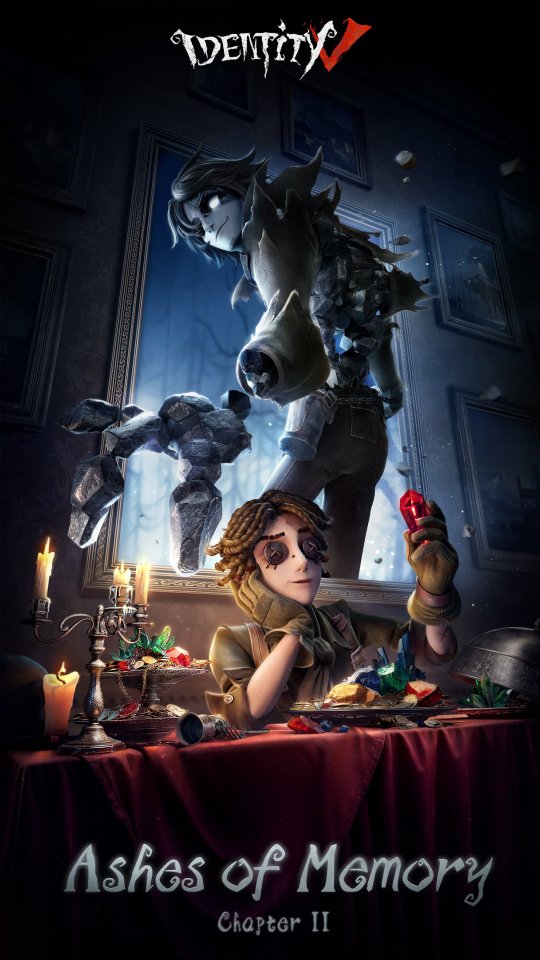
Thoughts and Theories about "Identity Switches"
This will cover current Identity Switches (up to Hunter Norton/Fool's Gold), as well as their connections between the Identity Switch and their normal version, motivations, personalities, backstories, etc... as well as some discussion about the plot of the main story and the Oletus Manor tragedy (including my theory regarding Jose's father's potential involvement in that event).
Regarding the topic of Identity Switches, it'll be easier to answer questions about those as Netease releases more, but for now we just have Novelist/Nightmare, Alice/Memory, Professor/Luchino, Weeping Clown/Joker, and now Norton/Fool's Gold (though we'll likely get Melly's hunter version sooner than later as well).
With Orpheus, we've known for awhile how he's talked about having multiple personalities or whatever, but the form he takes as “Nightmare” isn't real. So far, it doesn't seem like the rest of the Identity Switches (Memory, Luchino, Joker, Fool's Gold) are "real" either, at least in the sense as being those being their appearance in the real world and such.
"Nightmare" seems to have formed as a result of his trauma and the aftereffects of the tragedy that killed the DeRoss couple (Alice's parents) who he was close to.
I think Novelist's S-tier Essence, with Hollow, and that essence's backstory does the best job showing this, especially with Alice as Source of Evil's shock and disbelief that Orpheus as Hollow is the one behind everything she's seeing.
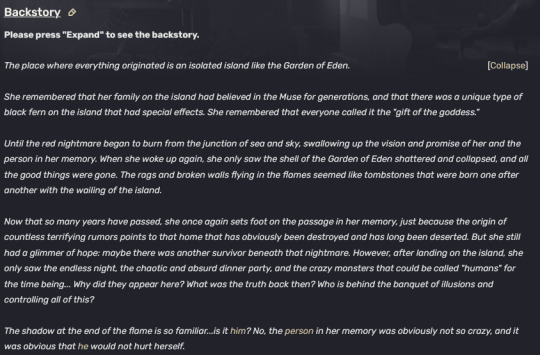

Hollow himself literally states he wants "revenge" during his essence trailer, as well as the rest of his lines during his trailer.
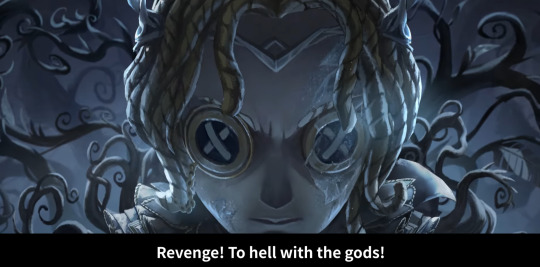
He used to be kind but his heart hardened after what he experienced, and he's no longer as trusting. He also now seems to primarily see the flaws or "sins" first and their good parts second (which i at least personally think is also visible from the way he writes most everyone's 3rd letters, which usually tend to depict the character in a negative light). He wants people to "repent" (with him seeing himself as the person making these "sinful souls" repent).
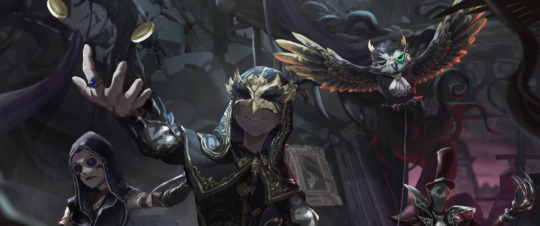
This idea of him focusing on the evil in people and wanting them to "repent" I think could be reflected in Orpheus aka Nightmare as the manor owner. I think it's best shown in Bane’s letter, where he see themselves helping this happen, but also from those same letters, we eventually see them begin to question Orpheus the same way Source of Evil did.
The best example being Bane in William's 4th letter, where we see his doubt beginning to show due to failing to understand why Orpheus would include an innocent like William in his experiments.

Based on Bane's 4th letter, where Alice talks about Bane missing by the time of the final game, it is possible it is because he begins to doubt that he might've disappeared.
Bane and Burke worked for the DeRoss couple before the tragedy, after which they worked for Orpheus as the new owner. They're people who are close to Orpheus, so if even they are questioning Orpheus' actions, along with Alice at least as Source of Evil, with Alice being Orpheus' childhood friend, that should show just how much he changed.
Sorry it took me so long to reach here, but I think this is what is reflected in Orpheus when he takes the form of Nightmare.
The reason he looks like a bird connects to how birds are stated to be what Orpheus' likes. The gas mask Nightmare wears, which we saw during Time of Reunion, may connect to the drugs Orpheus developed and is using (and how we see him messing with gas in Darkwoods during Time of Reunion).
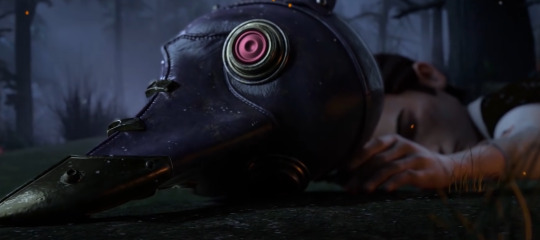
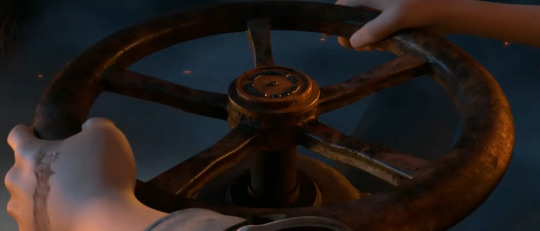
Nightmare's finger being a pen connects to Orpheus as a writer, a "novelist", while the music notes on his arm can connect to the Nightingale's song and the piccolo we saw being used during Time of Reunion to open the gates of the manor, and how Alice says during Ashes of Memory that the nightingale's song can open all the doors in the manor. We see Orpheus playing the piccolo during Novelist's release trailer too (as well as bandits who come in and kill Alice's parents during the live action trailer for ToR).

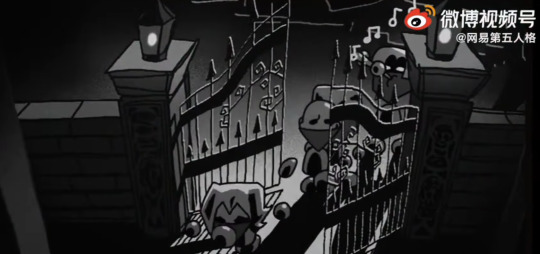
Then there's his name, which his rumor seems to explain the meaning of "Perhaps known only to 'Orpheus', this nightmare of his memory".
Finally there's how Nightmare is essentially a raven. This can relate to how the raven is sometimes seen as a bad omen, which fits with Orpheus' change after the tragedy.
So, at least based on Novelist and Nightmare, we can see his Nightmare is a combination of things related to Orpheus himself, his past, but also an emphasis on the... darker side of his personality. Many of the other hunter Identity Switch's we have I think are similar. Their hunter versions seem to put a spotlight on the darker aspects of their character and thus also why I think they tend to be depicted as inhuman, as a way to emphasize how they aren't how they normally are, except these dark parts which are normally hidden internally are now reflected externally in their appearance, and show them as monsters normally or exaggerated versions of their normal selves to mirror their inner darkness, but if that darkness was cranked up to the max.
Joker in a way is similar to Orpheus. Both used to be kind people but changed drastically after going through painful experiences. For Joker, this was the pain and humiliation he was forced to subject himself to day in and day out for the audience's amusement, the pain Sergei caused him, both physical by the acid, and the mental due to Joker's ruined face now preventing him from playing his role in Hullabaloo anymore, not to mention more emotional pain as Sergei was with the girl Joker loved, made more complicated when Joker learned Sergei was abusing her, whatever happiness Joker felt at Margaretha coming to him for comfort because of that abuse, complicated further as it was this event that made Sergei hurt Joker. And even more as Margaretha may not have loved him back, but Joker still cared about her. Put everything together, and it should make it easy to understand why Joker did eventually reach his breaking point, which was the day he killed Sergei, took his face, and then (likely) killed everyone else at Hullabaloo that day, which is the tragedy Mike refers to in his backstory, and is the thing motivating him to go to the manor.

Joker looks the way he does I think at least in part to represent Sergei, or at least maybe how Joker saw Sergei, but also combined with maybe how Joker wishes he was. Compared to Weeping Clown, Joker is much bigger and stronger. But he's also always happy and smiling, which is what Joker wants, what he's been unable to do for so long (just read Joker's deductions, I think it makes this apparent enough).
Moving on to Luchino, I think he's potentially the easiest to understand his Identity Switch/hunter version. His deductions and backstory make his interests clear, as well as how far he'll go for his research. Professor's trailer and backstory tell us in a way he sees his hunter version as "evolution" and stepping over the "last of my boundaries", while his current state (with Professor) is "a small price to pay on the path to truth". His rumor and summaries put best when they basically say Luchino's hunter version an emphasis on his "exploration into forbidden areas" or him going into "territories of taboo".

Maybe Luchino's most recent (4th) letter can give us a bit more insight. It says he is "I've spent my nights suppressing the inhuman desire within me and battling against that 'instinct'". Maybe, compared to his hunter version, this could help show that Luchino's hunter version, like the others, is still an emphasis on a character if they went all the way to the extreme and focusing on their darker traits. Based on his following comment in that letter about "understanding of humans", this could be what his real goal is.

Next I'll mention Alice and Memory. Memory we know is entirely because of Orpheus. It is how he views Alice. Or, to put another, it is what he wants to see. If we go back to Hollow's trailer, he says he wants to "rebuild paradise", which so far I think is the easiest thing to understand regarding what Orpheus is doing and why he has done everything he has.
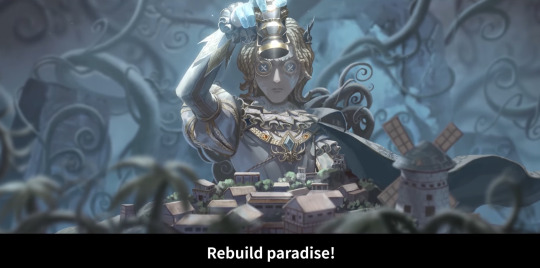
We know he was torn up by guilt over the tragedy based on Alice's letter to Orpheus in the 2nd anniversary package, where she says "Please don’t blame yourself for father and mother’s death". I think this can even connect to a line by Burke in Bonbon's deductions, where Burke mentions "Since he got back from his 'real' parents, that brat lost various valuable items again... He tried to take full responsibility for it, but such tolerance and protection will only feed their greed".
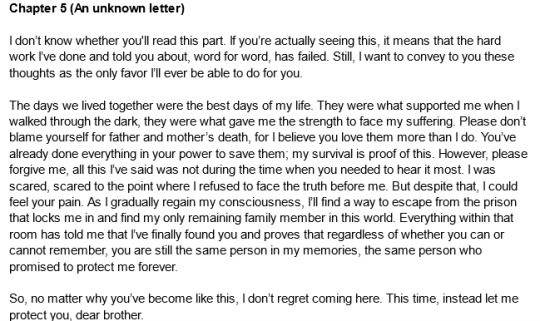
There’s also how, based on Time of Reunion trailers (live and otherwise), cutscenes, and even Hollow’s essence (S19 E1), at least to me it seems to be implied that it is Orpheus’ fault the bandits got into Oletus Manor to kill Alice’s parents.
The farmer looking people we saw in the portrait during Time of Reunion and during Ashes of Memory when Orpheus is talking about his past may be Orpheus’ “real” parents, the ones Burke mentions during Bonbon’s deductions that Orpheus may be taking valuables from the manor for, which implies Orpheus’ real parents were likely “greedy” people.

During Orpheus’ story in Ashes of Memory, he refers to the man as a “forest ranger” the DeRoss couple hired. This actually can fit with Burke’s deductions, where he talks about the DeRoss couple “bought their own staff” for the manor, after which he says there was “a strange boy in this annoying group”. Orpheus being the son of forest rangers the DeRoss’ hired would explain why he appeared when the DeRoss bought their staff, which could include forest rangers, as we know Bane used to be a forest ranger hired to work on the “hunting grounds of Oletus Manor” (those grounds being the Forest of No Return, as that’s where we can find Bane’s cabin) according to his backstory. Though Bane, unlike Orpheus’ real parents, was loyal to the DeRoss couple.
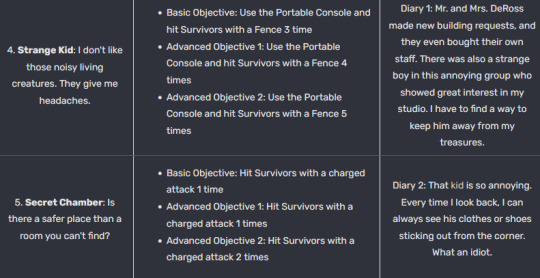
Orpheus in his story says this forest ranger (likely his real father/parents) “colluded with bandits” (during that scene we see the forest ranger dropping some coins, likely to imply he hired the bandits), the same bandits that killed the DeRoss couple and “ransacked the manor”.


We know from Burke’s and Bonbon’s deductions, as well as from Time of Reunion, that the “key” to get into the manor was a piccolo, likely combined with having to use it to play the nightingale’s song as Alice says during Ashes of Memory.
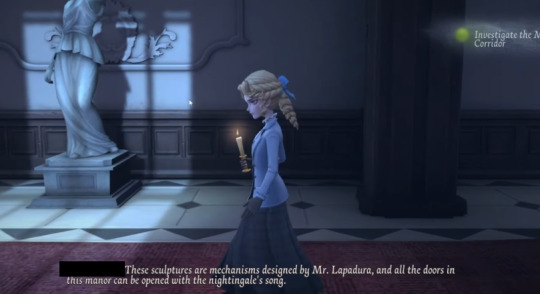
We see Orpheus playing on this same piccolo in Novelist’s release trailer. We also see the bandits playing on this piccolo during the live action trailer for Time of Reunion. During Ashes of Reunion 2, as Alice is walking through the Muse Corridor, we see the lines “How did they get inside?!”, implying it shouldn’t have normally been possible, likely due to the security we know Burke installed for the manor.
If the piccolo was the key, we know that must be how they got in. How did they get it? Well, we know Orpheus has been taking valuables for his “real parents”. We also know he’s held and used the piccolo before. Maybe Orpheus knew about it from getting close to Burke, who does say right after first mentioning Orpheus in his deductions that the kid “showed great interest in my studio” and “I can always see his clothes or shoes sticking out from the corner”. It’s also possible Orpheus was able to learn about it or get his hands on it due to getting close to the DeRoss couple, especially once Alice was born and he got attached to her.
If Orpheus did help the bandits get into the manor, potentially by giving them the key, that would parallel Hollow’s essence trailer well, as we see in that trailer the young, still innocent Orpheus reaching his hand out to the shipwreck survivors, with the very next scene being these same people attacking the manor.
It would also explain Orpheus’ guilt and why he blames himself for Alice’s parent’s death according to Alice’s letter in the 2nd anniversary package.
Now why do I say all this (besides the fact I think as I talk and couldn’t help going on a tangent as I think about other things)? Orpheus is the one who sees Alice as “Memory”. “Memory” is just as her name says, a memory of the past. Alice looks just like she did back then. Back when things were happy, before their “paradise” was destroyed by the events of the tragedy. Hollow does say he wants to “rebuild paradise”, which reflects his desire to go back, to “look back” if you will just like Orpheus in the actual Greek myth, an action that causes him to break his promise to Hades and thus lose Eurydice.
Orpheus is unable to see Alice as she currently is. He is unable to move forward. He is unable to get past the guilt Alice mentions in her letter to Orpheus. In that same letter, she tries to tell him “You’ve already done everything in your power to save them; my survival is proof of this”. This can connect back to the words we saw in Ashes of Memory 2 when Alice is in the Muse Corridor. We hear someone saying “Take her and run. And don’t turn back”, followed soon after by someone asking for where the kids went (Orpheus and Alice), with the last line we see and hear being Orpheus who says “Don’t be afraid we’ll meet again”. This last line likely is a reference to how Orpheus helped ensure Alice’s survival as she mentions in her letter, potentially him trying to hide her from those looking for them (if they were found, it is possible they would’ve been killed like their parents. Though Burke and Bonbon’s deductions imply they were found, it’s possible timing and exactly who found them was important to ensure their survival).
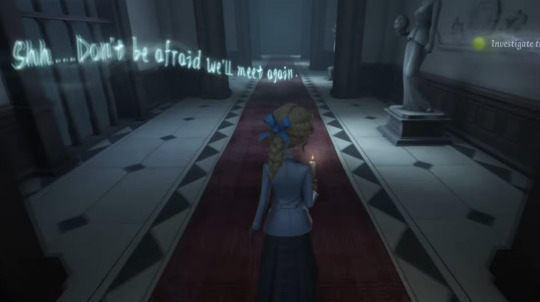
But based on the first lines in that letter, it seems Alice (in the present, likely during the final game) so far has failed to get Orpheus to stop what he’s currently doing. We know she’s trying to stop him based on the shock and disbelief Source of Evil expresses during her essence to Hollow’s actions, as well as during Novelist’s release trailer as we see a lady holding Memory/Little Girl telling Orpheus to “Stop it! End all this now”.

Orpheus is incapable of stopping himself from focusing on the past, on revenge, on getting back what he once had. His pain and desire is too great, potentially to the point he was willing to use the drugs on himself as Alice in her letter to Orpheus says “regardless of whether you can or cannot remember”. Drugs to help him forget, to ease his pain, but also the same drugs that cause characters to hallucinate seeing others differently, such as seeing Orpheus as Nightmare.
Siren Song is the drug that causes hallucinations. We see Alice, right after she sniffs the bottle, to briefly hallucinate seeing Mary and Nightmare.
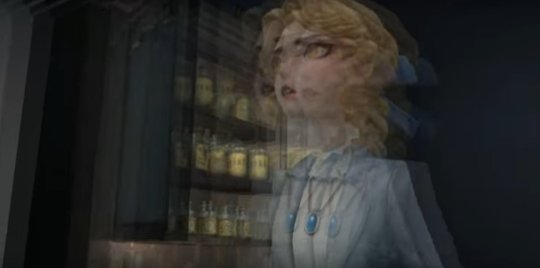
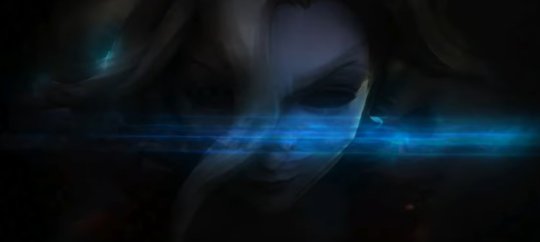

I also believe this is the same drug that was used on Jose’s father, Joaquin, and his crew the day they disappeared, depicted in Jose’s 1st letter. They mentioned things that the “cannons couldn’t kill”. The reasons the cannons didn’t kill anything was because the things they saw weren’t real. However, unfortunately for them, their actions still had consequences, which was why their ship likely sunk and why Jose, who waits for his father returns, never sees his father again, and why the Queen assumes Joaquin made off with her treasure and so punishes the Baden family.
(I also still believe in my theory that Jose’s father and crew were the shipwreck survivors depicted in Hollow’s essence in the Season 19 Essence 1 trailer who later may have ended up being at least some of the “bandits” that Orpheus’ real parents “collude” with aka hire or pay off to attack the manor, steal its valuables, and kill many of those inside, including Alice’s parents. We know Jose mentions his father changed course due to a storm in his 3rd deduction, while his 4th and 7th imply the “loss of most of the crew” wasn’t because they were fighting pirates, and instead because “the nightmarish waters had swept them away”. We know from deduction 2 that Joaquin’s change of course took them through an area “not recommended for sailing”. Therefore, the “nightmarish waters” and “loss of the crew” could imply they shipwrecked just like we saw in the Season 18 Essence 3’s (Source of Evil) and Season 19 Essence 1’s (Hollow) trailers. We also can make a good guess the large ship at Lakeside may connect to Jose’s father due to the items on the ship, including a map of the Mediterranean, where we know Joaquin was sent the day he disappeared, a paper with the same symbols as are on White’s compass, a Teru Teru Bozu doll, which is for praying for fine weather and can relate to the “nightmarish water” or the original storm that made Joaquin change course, a picture from Jules Verne’s Twenty Thousand Leagues Under the Sea of a sailor being grabbed by a giant squid, and a nighttime picture that looks very similar to the images from Wu Chang’s backstory trailer. This could imply Jose and his father have been here before, and if his father participated in the attack on Oletus Manor that killed Alice’s parents, that could explain why Jose is so traumatized after they return from this voyage based on Jose’s panic attacks stated to be worsening as well as explain why Jose says in his 7th deduction that the “nightmarish waters” swept away both his “companions” as well as their “conscience”, which implies they did something bad based on the implications from lacking a conscience, especially when we know Joaquin saw this voyage as so important he refused to turn back due to a storm and instead changed course through an area not recommended for sailing. If they did shipwreck, causing them to potentially lose all their cargo, that’d risk Joaquin’s reputation and his desire for fame and fortune. So he would be the type who’d be willing to fall to the lengths of attacking and stealing from a manor to potentially regain what he lost. This would explain why Jose says whatever happened “awakened the demons flowing through the Badens' blood” as well as the Queen’s “wealth” they were said to have “protected” and returned with after the voyage, which is what earned Jose’s father the fame and fortune he always wanted. And again, it would explain some of the other sarcastic lines in Jose’s deductions including “Redemption: A sin the gods can't forgive, but a king can”, which can tie to how Orpheus as Hollow says in the trailer for his essence “Only a sinful soul does as it pleases” and “Revenge! To hell with the gods!”. This idea could also explain why Orpheus in Jose’s 3rd letter calls Jose a “gift” from a “friend who passed away” that Orpheus “treasured” to use in his experiment, so much so he was willing to pause the experiment when it looked like Jose’s mental state was deteriorating too much. The “gift” from the “friend” that “passed away” can be a sarcastic way to refer to Jose’s father.)
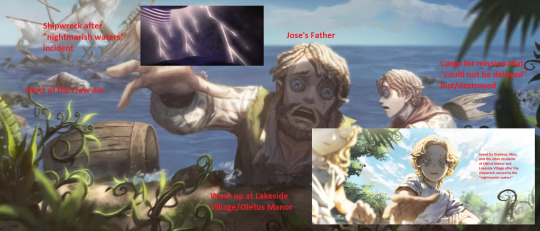

Speaking of the drugs that cause hallucinations, I want to go back to Joker. Remember how I said Orpheus is the one who sees Alice as Memory? Well I think it’s possible Margaretha is the one who sees Weeping Clown Joker as Smiley Face Joker. We know drugs weren’t used on Mike, Joker’s 3rd letter implies the same it seems based on “But even without the influence of drugs, Subject 8-0-3's emotions still moved uncontrollably toward the extreme”, for Violetta it was twice said that it “wasn’t the plan to use medicine” on her, and Murro like Mike has “?” for the 2nd spot of his serial number, which usually implies the character didn’t have the drugs used on them. In which case, Margaretha was likely the 1 to hallucinate Joker’s Identity Switch. And it makes sense too as Margaretha knew a lot about Sergei, ran away with him, but also experienced his abuse. We know from Margaretha’s 3rd letter that, due to the drugs, she mistook Joker as Sergei for a time. That could explain Joker having an appearance that may have a resemblance to Sergei. It could also explain why he’s as big as he is. It could be in part tied to her fear of Sergei due to his abuse.
That then leaves us with Norton and Fool’s Gold. We already got a good bit of information about him from his Design Notes video by Netease. His name itself comes from Norton’s 1st letter from Benny, as well as how the “strong contrast between his outer appearance and inner self” fits well with how Fool’s gold aka pyrite looks similar to gold but is actually iron.
After this part is likely the best answer to your question regarding what an Identity Switch is (https://twitter.com/IdentityVJP/status/1723176218563149901):
“IDENTITY characters and their bodies are somewhat similar to the concepts of id and superego. Or, it can be said to be the difference between the perception of other participants in the game and the person's own perception.
As for character design alone, when we select an IDENTITY character, we tend to enlarge his or her most prominent tags.
Norton's most notable tags were hard work, reticence, being weighed down by life, having no choice but to endure, suppressed anger inside, and ambivalence created by ambition and desire.
We showed one side through Survivor Norton and hoped to show another side through 'Fool's Gold.'”.
After this it further explains why he has a stony appearance, which they say involves his occupation as a miner and how he had been “losing his humanity”. This was why they made the hole in his chest, to show the mining accident damaging “more than his body. When he lit the fuse, his morals, social norms, and appearance of good nature were completely shattered”.
As we said, the Identity Switch/hunter versions are essentially an emphasis on their negative traits which are turned up to the max in this version of themselves. Sort of like how a ONCE skin is a what if something about their story changed, Identity Switches/hunter versions are like a what if the worst or extreme parts of a character were cranked up way more than they actually are.
With hunter Norton, going back to his design notes, it describes this version of Norton being someone that was “reborn in the collapsed mine”, while the hole in his chest involves him “no longer needing the lungs that had been in constant pain before, and that he had been given a new lease of life!”

At least for me personally, another visual for this being a version of Norton with his darker traits magnified is how Norton’s usually crooked smile is now instead a full smile. Norton in his survivor version has a crooked smile to emphasize his name as well as his 2 sides, 1 being his “gloomy and depressed” side (the sad Norton desperate to escape poverty and depressed at his inability to do so no matter how hard he works) while the other is his “avaricious” side (the one affected by the “magnets” said to have “disturbed his brain”).

Fool’s Gold having a magnetic pickaxe he can throw and recall, as well as dash towards, is a reference to Norton’s magnets, the ones he made after he took a chunk of the meteorite from Golden Cave after the mine collapse before managing to dig himself out.
Fool’s Gold/Hunter Norton is a version of Norton that has his greed and willingness to do anything to escape poverty turned up to the extreme. This is a version of Norton no longer in pain from black lung, a version no longer letting himself be abused by his coworkers or employers, a version where his darker side won the inner/mental conflict in Norton, which is depicted in his backstory trailer when we see him holding his head in pain and see both survivor Norton and hunter Norton at the same time (to even better show this is a conflict between survivor Norton, aka his better/good side, and his hunter version, aka his worse/bad side).
An even easier visual and proof of this conflict being part of at least normal, survivor Norton comes from Norton’s 2nd letter. The author is Norton, but he’s also talking to himself, trying to convince himself to accept the job and to kill the female he was asked to kill for the monetary reward he was offered. The fact he has to try to convince himself shows Norton needs convinced aka he hasn’t decided completely if he will go through with it or not, or at least he’s having 2nd thoughts, which again also helps to show survivor Norton and hunter Norton are different (that hunter Norton isn’t necessarily the real version, it’s a what if his darker side was magnified).
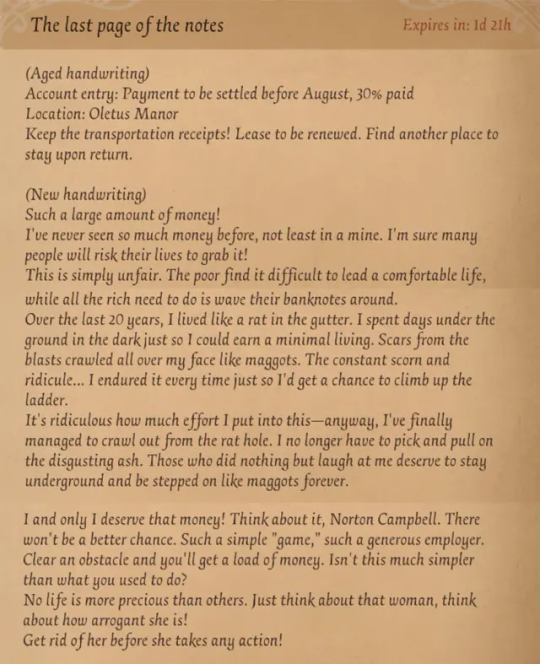
There is also the chance the eye in Golden Cave is involved in all this. The Famitsu article already suggested the magnets may be messing with his head, magnets made from the meteorite that came from Golden Cave, where the large eye is. We even see similar fiery eyes appearing as effects with hunter Norton’s S-tier Infernal Skin. I do think there’s a chance hunter Norton is a version of Norton controlled or manipulated (more than normal) by whatever the meteorite and the eye in Golden Cave is.
(I have discussed the idea of the Golden Cave eye being Cyaegha before: https://www.tumblr.com/sirenjose/731920677136924672/golden-cave-eye-cyaegha-theory-updated?source=share).
While I’m thinking about it, I do wonder if we can say Orpheus’ and Norton’s Identity Switch’s/hunter versions are different from the others. I say this as Orpheus has already been said to have multiple personalities, while for Norton he’s already been said to have 2 sides and we’ve already seen him arguing with himself in his 2nd letter. In a sense, I wonder if we can say their hunter versions are “real” in a sense, just that the ones we see in game are now actually (externally) visible and magnified more than normal.
Though speaking of the 2 of them, going back to you wondering if it could relate to the Identity Switch being someone more willing to follow the manor owner or supervising the games, we see Norton during Ashes of Memory 2 seemingly working with Norton. This is based on how Alice encountered Hunter Norton while chasing after Orpheus (the black figure she was initially chasing after), then she is knocked out by Orpheus while Alice is running from Hunter Norton, who we know is actually Norton based on his reflection in the puddles. After this, we then see Norton using the Hydra drug on Alice, with Orpheus likely nearby considering we hear him questioning if the drug is working as Norton is giving it to her. Norton is only officially announced to arrive at the manor the day after that scene takes place. The other bit making it pretty evident Norton is likely working with Orpheus is how we see Norton in the secret basement/cellar that no one besides Orpheus (and Alice now due to her investigation, but none of the other participants at least normally are shown to know anything about it) knows about, not to mention how he knows about Orpheus’ drugs that he likely wants to keep secret from everyone, especially the other normal participants, as them knowing would likely ruin his experiments.
So Norton (or the others really) I don’t think was turned into a hunter/got an Identity Switch because of a “punishment”, nor has he done anything I believe to warrant a punishment, especially with him seemingly being someone directly working with the manor owner rather than just 1 more game participant.
The hunter versions for Orpheus, Joker, and Norton seemed to have formed due to pain (especially over a long period of time) and trauma (powerful experiences). Memory is due to Orpheus’ desire to go back to when things were happy. Luchino I’m less confident about, but maybe we’ll get a better idea as we learn more about his game. It’s possible he could be because of his obsession. It could also be because someone hallucinated him that way similar to Margaretha to Joker and Alice to Norton, which is a combination of knowing or being told about the person and seeing them as more extreme than they currently/actually are likely due to fear. So far though, drugs seem to be the main cause, though not all hunters are just hallucinations (like Leo), but it’s hard to say without full confirmation by Netease how much of each hunter is hallucination and how much is real. We can make guesses, like Bane for example seems mostly real, but who knows if they might surprise us and show their real version is a bit more toned down, like they did for Joker and Luchino.
(As for the question about detention, I don’t believe it’s ever explained in detail, so I think it’s fine to imagine or explain it however you may want. My best guess is maybe it can be explained sort of like adrenaline. Kind of like how the last week before a season ends is called Final Push, I think when the last cipher machine is decoded, it’s like the “final push” to the end. For survivors, this is to escape. For hunters, it is to eliminate everyone. Survivors “borrowed time” talent, which is when they heal when the last cipher pops, has the text “To what end will the last gleam of hope lead?”, which connects with this. Hunters’ detention on the other hand has the text “What's the hurry? Stay here forever”, which I think could help back up by guess that survivors may be more “adrenaline”, while for hunters it may be more… something like bloodlust? The desire to eliminate them all before they can escape. If you want to imagine it as a loss of whatever humanity they had, even if temporary, I think that’s fine ^_^; !)
#idv#identity v#norton campbell#prospector#orpheus#novelist#nightmare#joker#smiley face#weeping clown#luchino#professor#alice#memory#alice deross#jose baden#first officer#idv norton#identity v norton#idv prospector#identity v prospector#fool's gold#fools gold#hunter norton#idv fool's gold#identity v fool's gold#idv fools gold#identity v fools gold#idv hunter norton#identity v hunter norton
111 notes
·
View notes
Text
as much as it's frustrating how only two of the umi episodes were penned by Sayo in the irl layer, I think it's fascinating to compare them with each other because so much becomes clear when you look at the writing choices in each one side by side
the specific ways in which Legend and Turn differ from each other makes me certain that one was among the first message bottles she wrote whereas the other was one of the last, but it's not clear which is which -- it depends on how you interpret her internal journey and process of creating all these tales and fragments. Sayo's writing as a whole is very marked by her personal observations of the sins and struggles of the family and using them as mirrors to actually write about herself, using characters as stand-ins that give voice to her own inner thoughts, but both stories are very different in tone and approach
Legend feels almost methodical with the ways the murders and illusions are carried out, and the way her resentment manifests is more controlled, understated. you need to wring it around a bit more to 'see', but in my understanding: it's interesting how the 3 cousins are all made to suffer incredible grief losing their parents and love interests in quick succession (Battler being the only adult cousin who only lost his parents and not a love interest feels important to get him to remember!), but they live until the end then get invited to the Golden Land and choose to resurrect their lost love. By contrast, Natsuhi is put through the wringer through and through while being given the opportunity to be the star of the episode with her struggles as a woman taking the center of the stage, only to lose a duel (!) to Beatrice and be denied entry in the very last moment. there's a lot of conflicting emotions all over the place in both cases which is of course very characteristic of Sayo but I'm fascinated by how the cousins' entire role in this episode is to lose everything they had, experience earth-shattering grief and be led towards a romanticized afterlife where they can heal that grief, making the choice to resurrect the love that was lost, whereas Natsuhi's role is to mirror and portray Sayo's actual interiority and struggles (many that were caused by Natsuhi herself!) that went unspoken her whole life and then be challenged to a duel and get shot. to shoot Natsuhi is to shoot herself. shooting her actual personhood and interiority and struggles to death. as a metaphor for the entire ceremony of Beatrice's revival being a suicide in order to pass on into the afterlife where compartmentalized parts of herself can simultaneously exist as whole and find happiness with their respective love interests. the final step of rejecting reality, seeking love by truly becoming fictional while the human heart of the actress behind the characters dies buried between the lines of the text unless you 'see' it. god she makes me insane. anyway
Turn by comparison is very brutal. Beatrice steps onto the gameboard and is at her cruelest here, and the deliberate narrative choices are dripping with anger, helplessness and sorrow. everything about the focus given to Rosa in her role as the main accomplice who only had eyes for gold vs the framing of the tragedy as the gift of a halloween party for Maria, the wolves and sheep allegory, the way Shannon and Kanon get repeatedly kicked around for trying to resist their fate and wanting to believe in love despite everything. Kanon's "corpse" being desecrated by being forcefully resurrected twice, not being allowed death. the barely contained sexual conflict and trauma in the themes and imagery all over the episode. the way Sayo personally kills Jessica and George and her personas are killed along with them, an utter rejection of the possibility of being loved in reality as something that can only happen in death and fiction, so they all get to die together and be connected by their souls, all portrayed as the innocent victims of a vicious witch. the unspoken horror of one of the few true closed rooms in the game, with Sayo physically killing herself while facing herself in the mirror after doing all that. no one could dispute that a coffin is a closed room. and with closed rooms in this game often symbolizing being trapped in your own logic even though the door was unlocked all along, it absolutely stands for Sayo giving up all hope. Beatrice won, the gold won, the family's curse won, Sayo's worst feelings regarding herself won. Kinzo won too, even as a dead puppet haunting the narrative, he 'lives' to the end and gets his miracle of meeting Beatrice granted again. just that says a lot. Turn is horror after horror and you can only fully grasp that with the context for her writing choices
Legend feels relatively composed and deliberate in its choices of allegory. it also carries a lot of pain and conflicted feelings (particularly with the way she hatewrote Battler in it) but the text in Turn is basically bleeding all of her self hatred and suicidality and conflict over the idea of being loved. Legend is for the most part a straightforward mystery embellished in illusions with her heart still very baked into the text, and it has a big focus on solvability (Eva as the main accomplice basically points Battler toward the solution... which he rejects) and gambling/risk-taking, with multiple moments where Sayo left things out of her hands and up to chance, making it so that she could've been stopped even by accident. and then Turn is basically an eruption of all the horrible feelings churning in her heart. it says a lot that in Legend, she left the people she loved the most alive until the end, as if hoping until the very end for the miracle that at least one of them would see through her and stop her from murdering them, while Turn kills off the cousins (barring Battler due to being the detective) and then herself before the ceremony even ends, destroying all outcomes beyond utter annihilation. Turn is absolutely about her surrendering and leaning right into the illusion she casts on herself of being an irredeemable monster, so Beatrice absolutely plays into that role here. fitting that it ends with Battler surrendering, too
the sheer tonal contrast between these two message bottles tells a story of the journey of how Sayo's mental state changed as she kept writing and running over her murder-suicide plans over and over again -- it can either show her hope and composure deteriorating as she resigned herself to accepting her dead-end of fate (Legend -> Turn) OR the raw emotion she felt in the beginning of the writing frenzy dissipating as she kept going, any result being a satisfactory outcome but still focusing on planning out a difficult but fair mystery, staking her hopes onto the miracle of having it solved by the person who shared her personal philosophy on mysteries (Turn -> Legend). I don't like relying on Confessions too much as "confirmation" of Sayo-related things because it doesn't sit well with me, but if you go by the way it portrayed the process, then it strongly suggests the latter explanation
wish we could have seen more of the countless tales she personally wrote because you can see so much of her personhood hidden within the text, her thought processes, personal views and authoral voice all providing characterization, but the two we got already tell entire untold stories. it's funny that the two first episodes are usually thought of as the least interesting ones on a first read when they're the ones with the most firsthand insight into the culprit's heart and how she felt about everything. the sorrows and pain but the strength of will and hope too
121 notes
·
View notes
Text

☾┅ about me ┅ ☽
hi, call me mika! i'm 21+ and i go by they/them pronouns. i'm a se asian writer + aspiring literary translator based in the uk. this post is essentially a writeblr reintroduction as i am starting anew in the community with this blog, and i'm really excited to share my wips and connect with all you lovely writers out there! i'm also tag and/or interaction friendly (although my reply speed is... not the best especially for tag/ask games, but i'm trying!), so please don't be afraid to say hi ♡
☾┅ writing interests ┅ ☽
important note: my works may contain mature and potentially triggering topics. viewer discretion is advised.
╳ i'm mainly a prose fiction writer, although i may dabble in scriptwriting and poetry at times. ╳ genres: speculative fiction, historical fiction, thriller, literary fiction. ╳ themes: sociopolitical commentary, satire, dark comedy, angst/tragedy, tragicomedy, morally grey characters, queer romance. ╳ open to reading all genre and themes! you're more than welcome to reblog this with your wips or tag me in them, whether or not they feature any of the above. the above lists are not exhaustive because to this day i still don't know how my writing brain works. ╳ i take plenty of writing-related requests (beta/proofreading, critique, collabs, translation work, etc.)! please refer to my carrd for more info, or contact me directly for inquiries.
☾┅ main wips ┅ ☽
will o' the wisp :: adult sci-fi/thriller novel. ╳ award-winning talk show host and journalist noe crane is constantly treading a tightrope as he assumes his secret vigilante identity behind closed doors, but things get worse when his past comes back to haunt him. ╳ features: tragicomedy, morally grey characters, lgbt+ characters, complex relationships, modern setting, superpowers, conspiracies ╳ wip intro here!
the duña duology :: adult weird fiction duology. ╳ a troubled man in his 30s attempts to escape from his past and seeks refuge in a run-down inn, only to find himself caught up in a dangerous conspiracy against the world. ╳ features: adult (30+) characters, unlikeable protagonist, multiple universes, high concept, complex worldbuilding, retrofuturism, found family, conspiracies, aliens (?) wip intro coming soon! message if you want to be tagged.
a history of the tenshima gang feud (working title) :: new adult sci-fi/romance novel. ╳ when a national museum tour guide somehow travels back to the city's deadliest era in history as one of its disgraced figures, he will soon find that his beloved city isn't what it claims itself to be. ╳ features: time travel, alternate future, fictional setting, criminal underworld, ensemble cast, sociopolitical commentary, morally grey characters, lgbt+ characters, love triangle, lovers to enemies, friends to lovers, mcd, tragedy wip intro coming soon! message if you want to be tagged.
lilium carnage :: historical steampunk visual novel (collab with @nana7esque) ╳ four characters on two sides of the same coin. each of them are determined to deliver their own justice in the corrupted land of navona, even at the cost of their own lives, but little do they know that there will always be a bigger price to pay. ╳ features: alternate history, fictional setting, choice-based story, multiple endings, morally grey characters, lgbt+ characters, tragedy, enemies to lovers, complex chara dynamics wip intro coming soon! message if you want to be tagged.
☾┅ side wips ┅ ☽
shelved wips, wip ideas i have yet to develop, etc.
╳ by the kiss of the sleeping night :: thriller/romance webtoon collab with @nana7esque ╳ retelling of the nyi roro kidul myth ╳ modern setting character-driven script with each characters being an allegory to the seven deadly sins
feel free to interact with this post especially if you're also a writeblr! ♡
83 notes
·
View notes
Text
All this discourse with Saltburn may or may not being an eat-the-rich movie takes me back to when people's main criticism of Parasite was that its writing failed by making the Kim family too unlikable.
If you ask me, I feel like if you went into either film thinking them as eat-the-rich films, then it does come off as bad writing. However, neither story works well as an eat-the-rich film because that was never the intention. Sure, class disparity and social inequality are both vital themes but the main point of the EtR genre is about taking down the system, which neither film even tries to accomplish.
Parasite is a criticism of modern capitalism. It was never about pitting the poor against the rich. Bong Joon-Ho said himself, "It's a comedy without clowns and a tragedy without villains." The Kim family aren't meant to be hailed as heroes, and nowhere in the writing does it come off like that. But you end up asking yourself how come this family, who is clearly very capable and skillful, are just barely surviving off the edge of poverty and has no choice but to resort to scamming an entire family just to make a livable wage. Keep in mind they were barely making a profit—the biggest change to their lifestyle was being able to afford slightly better food than usual. Why is it that the poor will go as far as to fight among themselves just to continue leeching of the wealthy? Who benefited aside from the Parks? You could argue that Mr. Kim stabbing Mr.Park in the end was his way of fighting the system, but the film ends with him stuck in the basement, feeding off the house itself, still contributing to the same system that placed him there. EtR would've been more about the negative effects that come from the Parks from hoarding so much wealth that could sustain three entire families, making them deserved of comeuppance. Parasite instead focuses on how it's the system that keeps these class divisions in place.
It's the same with Saltburn. Oliver Quick does, in his own way, challenge the system. But what people forget is that it's not even as though the system ever worked against Oliver—he grew up in an (upper) middle-class household and managed his way into a prestigious university. He may not have been in the 1%, but he was at least in a position where he could go the rest of his life being comfortable. He just got greedy. He wanted more. He wanted to be on the inside. Saltburn isn't a story where a person painstakingly makes his way up the social ladder after starting from nothing whilst making the rich succumb to their sins; there is no justice or vengeance taking place here. Just a single man who manipulated the system to get more than his fair shares, just like his predecessors of Saltburn did. If it was EtR, it would've shed more light on how the Catton family and their wealth do more harm than good, justifying Oliver's actions. And even though they're unlikable, the most harmful thing about them is their performative charity and willful ignorance of the real world. This doesn't mean Saltburn lacks in substance; it's a compelling narrative on obsession and hedonism which introduces an excellent anti-hero, it just doesn't work as an EtR story. And it isn't supposed to.
#Saltburn#Parasite#eat the rich#Bong joon ho#anti villains#film rant#critical analysis#emerald fennell
57 notes
·
View notes
Text
(Flufftober 2023) Nightmares
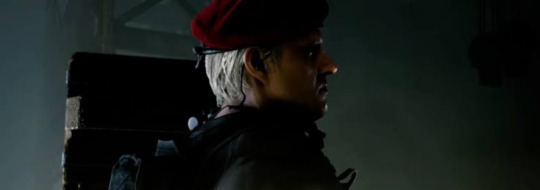
Main Masterlist I Archive Of Our Own
Flufftober 2023 Masterlist I Prompts List

Tags : Fluff, Romantic Fluff, Nightmares, Comforting Hugs, Comforting Words, Flufftober 2023, Reader is genderless

(Flufftober Day 27)
"Do you need something else?"
"No, thank you. Jack."
There are no words to describe how you are feeling right now. They fail to capture the emotions in you. Your heart is pounding rapidly, and your vision has turned into a hazy fog devoid of guiding light.
Jack lingered his arm around your waist, drawing you gently into his delicate embrace. He draws closer until his comforting yet masculine aroma wanders around your presence.
You nestled your head on his chest, sitting like a fragile creature on his lap.
The TV's white noise coursed through the entire room, creating a tranquil atmosphere between you and Jack. His gaze fell toward your figure, snuggled against his chest, your vulnerability in his arms, shivering and crying like a little cuckoo, so fragile yet so delicate.
The room is coated in black, revealing their mystery. The silence lends a creepy atmosphere, making Jack glance at the stairs, yet he finds nothing.
"Jack," you call him with a weak intonation. He brushed your hair with his fingers and noticed you were vulnerable. "How do I escape from this nightmare? I'm tired of pretending that I was strong."
You lose yourself in the darkest veil in your mind, building towering walls of despair. No matter how often you try to calm yourself, the nightmare persists. Ruined your nighttime.
You felt a suffocating weight on your chest as the cruel flashback trespassed your very mind, trying to manipulate you once again to push you down into another nightmare.
A slight kiss was placed on your head; he tightened his embrace, and now you can feel his heartbeat.
"I'm sorry, darling, but I don't have a good answer," he mused. "If I had, I'd have shared it long ago. But sweetheart, it doesn't mean I don't care."
"Hmm..."
You rub his palm with your fingertip. In that fleeting moment, you drown yourself in reverie, and the chilly air hangs with your emotions, connecting you to release your sorrow and pain. But...
"Darling," his voice resonated. "You don't need to be strong. It's okay to cry and regret."
He stopped and continued. "Repentance isn't a sin."
Oh... right.
It isn't a crime.
But...
How could you make such a mistake?
After Operation Javier, you lost everything. Everything, including your will to live. You've tried to distance yourself from the tragedy. Yet the nightmare comes into your life and eats you alive like a monster.
Everyone is dead. Everyone is suffering.
But you're still here without any wounds on your body.
"Hey, listen to me," Jack mused.
"I won't let you drown in the same nightmare over and over again. Even if my soul and mind are divided in seven ways, you will always be my home. I'll be your sun in your dark veil and bring a new moon into your life. So please don't be sad. Because, darling, your pain hurts me. I love you, and I miss your smile. Please come again to me and love me again."

Note : Damn, still crying over Operation Javier. Krauser doesn't deserve this. (っ˘̩╭╮˘̩)
Sorry for the late update, hehe. But I promise I won't abandon this. Anyway, after this series ends, I'll upload a new Wesker fanfic and Gojo (Jujutsu Kaisen).
It's been a long time since I've been writing about Gojo. I have posted so many times before on my FFn account; it's so fun writing about that man. Once the story is finished, I'll post it.
#resident evil#resident evil krauser#resident evil jack krauser#jack krauser#jack krauser x reader#jack krauser x you#krauser x reader#krauser x you#jack krauser fluff#krauser fluff#resident evil fluff#flufftober 2023#flufftober
73 notes
·
View notes
Text
The Writing of Pandora Hearts and its Depiction of Human Ego or an essay I wrote for class because I love PH so much (mainly spoiler free except for a small tangent on Lottie’s character)
When you think about aspects of the Shonen Demographic, what tends to come to mind? Usually it’s something along the lines of fluid yet repetitive action, a lovable cast of characters who get down but quickly move on, and a protagonist who can handle anything. But when you ask a fan of renowned and well-liked shonen such as Hajime Isayama’s Attack on Titan or Hiromu Arakawa’s Full-Metal Alchemist, what’s most reminiscent is how the characters are written and their depth. That’s why when anyone asks me what shonen I’d recommend, I always immediately recommend Jun Mochizuki’s Pandora Hearts. Jun Mochizuki is a master at her craft, be it with her beautiful watercolor illustrations, the fantastical and fairytale-like world building, or what I associate with her most—how bitterly human she writes her characters and how it hits the reader. The way Pandora Hearts’ ornate writing twists from this alice-in-wonderland inspired gothic adventure, to a story about the beautiful yet ugly depths of human will and ego, genuinely makes me believe that it deserves one of the top places in the Shonen Demographic.
It’s a relatively standard set up. Pandora Hearts follows a young boy by the name of Oz Vesalius on the brink of his fifteenth birthday. During his coming of age ceremony a sinister group called the Baskervilles condemns him for his sin of living, and casts him into the Abyss—a hellish nightmare dimension resembling a broken toy box filled with grotesque monsters called ‘Chains’. With the help via contract of an amnesiac girl who calls herself Alice, her identity being the chain “Bloody-Rabbit” that strangely takes an alternative human form, he escapes the Abyss only to find himself ten years in the future. The first few chapters set up our boyish protagonist’s temperament and desire, as well as the dangers he will encounter with sprinkles of what the world of Pandora Hearts is like. I relate this to the beginning of Attack on Titan, introducing Eren and his friends’ personalities and values before getting thrust into the harsh reality of their apocalyptic world.
The story begins in a cliche, yet familiar way. It starts off relatively light and almost whimsical as it makes you think it’ll follow the monster(chains)-of-the-week format; Oz seeking out the Baskervilles for the reason of his ‘sin’, and Alice seeking out her fragmented memories. Preceding the Shonen Demographic, kids grow up with something like Pokémon or Digimon where there’s a new ‘monster’ to ‘defeat’ quickly each week. It’s a way to progress the story for the very young child viewer in a fun and easy way, even if they miss an episode or two. The main purpose of presenting the idea of this familiarity, is to rope the reader into a false sense of security.
This format is abandoned just as quickly as it was proposed as the story gets more convoluted, pulling the reader in. All the characters seem to be hiding something, the enemies are closer than you think, and at some point you genuinely question yourself if they’re truly the enemies here. You begin to realize that despite all the secrets everyone has—no one actually knows anything. The protagonists, their comrades, and even their enemies; everyone is in the dark in regards to the truth of the catalyst event a hundred years prior, The Tragedy of Sablier, except for the main villain of the story. The fact that the reader is on the same level of knowledge the vast majority of characters are on allows the reader to empathize with them almost as actual comrades, instead of seeing them as simply characters in a story.
Usually in shonen, the reader is given scenes of the antagonist’s side so that the reader has information the protagonists do not, such as displayed in Full-Metal Alchemist where the reader is exposed to multiple scenes of the Homunculi and their plans before Ed and Al are. Shonen villains tend to be bastards after all, pure and irredeemable evil in support of an evil system. This is meant to build a sense of foreboding for the reader, as well as anticipation for how the main characters deal with this danger. It’s because of this storytelling method that separates the readers from the characters, driving almost a wedge between them. Readers' thoughts go from, “I wonder why this happened” (solving a ‘mystery’ in the moment alongside the characters), to “I wonder how the characters will deal with this” (an event the reader already knows will happen soon).
Particularly what sets Pandora Hearts apart from this, is that Jun Mochizuki allows us to empathize with the villains due to their similar level of ignorance as the heroes. We are shown scenes of the villains, but not so much that we gain any major insider plot knowledge. Rather, the most important insider information the reader receives are the bonds between the villains almost paralleling the bonds between the hero cast we’ve already fallen for. Charlotte, who is somewhat one of the Baskervilles’ ringleaders, presents herself uniquely. She is very devote to the Baskervilles’ cause of obeying their leader, and kills and torments without a second thought. Yet, Lottie is as desperate for answers as Oz’s crew. You can see it on her face, where she contemplates as she stands beside her fellow Baskervilles whom she loves like family, “Is what we’re doing truly right?”. It is a very subtle writing strategy, one that acclimates the reader to feel for and humanize the ‘inhuman’ enemy, gradually building up to Pandora Hearts’ crescendo.
This intricately planned writing Jun Mochizuki has drip fed the reader pays off during the story’s climax. By the time the truth is revealed to all, the reader is left in an array of chaos alongside the cast, questioning everything. One of these, being the protagonist himself. Everything we associate with our dear hero, Oz; his classic young yet burdened hero demeanor with a high moral compass, his complicated emotionally charged relationship with his estranged family, his immortalized friendships with Alice and his childhood friend Gilbert that feel as if they could stick through everything—at some point, all of those threads that make up ‘Oz Vessalius’ fall apart. His connection to the antagonist and how it affects the story and narrative still shakes me to the core to this very day, and you’re left wondering what exactly is left and where we can go from here. Everything Oz knows, everything we the reader knows about him and the cast we’ve come to love, suddenly becomes false. You can’t help but feel played, yet when you read back desperately to validate your feelings, there’s the cruel realization that you were never lied to. All the signs were there in your face and it was you, the reader’s, choice to misinterpret them. It’s difficult to manipulate the reader using the reader’s own assumptions and prejudice, and yet Jun Mochizuki has done it in Pandora Hearts.
How Pandora Hearts takes everything the reader knows and destroys it is such a transformative experience that transcends the expectation of a normal shonen. The layers in which Jun Mochizuki had written are so deep, that the characters' roles we tend to reduce to tropes and generalizations have so much meaning to them. Oz, our heroic protagonist, maybe isn’t the strong willed boy he’s supposed to be; and maybe the Baskervilles, despite the atrocities they’ve committed, maybe aren’t wishing for world destruction. Our lovable cast of characters are hypocrites, sometimes betraying themselves or people they’ve sworn to, and reasons we expect to be grandiose turn out to be simple selfish, raw human desires. Those that selflessly fight for ‘love’ are simply fighting for self preservation, and those that do everything for their ‘ego’ crumble so easily in face of their love. Pandora Hearts is just like other shonen, but also not. There’s action, characters who get down but sometimes need time to move on, and a protagonist who tries his best to handle anything. Most of all, they’re all so painfully human, and I think that’s what is at the heart of shonen. Jun Mochizuki’s Pandora Hearts’ intricately written story, with its raw portrayals of the human will as well as the world crashing twists and cast you can’t help but love, is exactly what the shonen demographic deserves.
#Pandora Hearts#fandom essay#mentions and references to the beginnings of#fullmetal alchemist#and#attack on titan#oz vessalius#jun mochizuki#VERY VERY small#pandora hearts manga spoilers#but I try to be as vague as I can while trying to keep interest#pls I’m trying to get more Pandora Hearts readers help me fellow fans#I need people’s lives changed and to ramble about it with people without worrying about spoilers#because dammit there’s way too much to go over#and too many characters
18 notes
·
View notes
Note
Am I here to bring some 2008 Brandon propaganda? huh, I am. My younger self would be so disappointed in me. But then writing propaganda for underdogs is fun!
Someone brought up Alan Rickman's voice as being one of the main attractions of his portrayal of Brandon -the same can be said about David Morrissey! Hear him reading a poem, or a short story! His voice was my only inducement to get through the PI Billy Rucker radio dramas, which I wouldn't recommend to the public at large because they deal with really dark subject matter and they do it in a neo-noir style that makes it harder, so... I digress.
As another side note/digression, if I had a nickel for every time colonel Brandon was played by an actor who is mainly known for playing villains, I'd have two nickels. Which isn't much, but it is weird that it happened twice.
And speaking of villain typecast actors in Austen roles, I feel one can say of Morrissey's Brandon the same I say about Mark Strong's Mr Knightley, re: the writing. The sins of Andrew Davies loom as large as his legend.
I think he has great moments when the script allows it -the way he goes through all the inflections and changes of emotion during the reveal of the Eliza backstory to Elinor is really subtle and skilled.
We also get a couple scenes of this Brandon having a special concern for Eliza jr -he goes visit her:



She's clearly a beloved person to him!
And we have this little moment when they arrive at Cleveland, and Mrs Palmer introduces her baby son to them, and we can feel he's thinking of the tragedy of his Elizas.

Yes this was mostly about David Morrissey's voice, but in my defense it is THAT good.
Willoughby (1995) Vs Colonel Brandon (2008)
20 notes
·
View notes
Text


things that happened at the haunted house:
i freaked out a scare actor
i bonded with the chainsaw dude
i met a really sweet cheerleader zombie
they played HOT TO GO!
they played Welcome To The Black Parade
they played I Write Sins Not Tragedies
i learned that my main reaction to getting scared is “AAAAH- hi..” followed by a really awkward wave
i yapped about mcr with some guy
9 notes
·
View notes
Text
hi im on my bullshit making up random aus again
this is steren! not his main story either. i might write up his main story in bits and pieces at some point. but this is an au bc i wanna see him happy with his parents.
so he's getting dropped in @mulberrycafe's vivi's world. sorry kid, azura will grant your wish but not how you're thinking
obligatory picture of steren and some background info from this post. and bonus baby picture.
this is just part 1. part 2 will be the gang dealing with an unconscious dunmer who fsr has a moon and star ring of his own and nerevar's sword. which will be uh. concerning.
(also i didnt proofread this :'D)
--
Falling to his knees, Steren coughed up a bit of blood, willing the last of his magicka into a healing spell to keep his organs stable.
It hadn’t been an easy battle, both physically or emotionally.
Dagoth Ur, after all, had at one point been his father.
Fate was cruel like that. His first lifetime he spent his whole, although very short, life chasing after his father and his legacy. He felt alienated in House Indoril, and when rumors stirred he might be of an unsavory bloodline no one dared name, things became more complicated for him. When he was a young adult--when he should be just spreading his wings and leaving to the world--he had found documents that were to be burned from the sinful Sixth House.
Documents that clearly defined that he was born from Voryn Dagoth. Born from a supposed fling he refused to name and died shortly after childbirth that the Lord of House Dagoth refused to let rot and instead welcomed as a legitimate son with open arms. It seemed to go along with his memories too--hazy, faint things from when he was such a young child. Memories of a golden skinned mer with long black hair that would hold him close, laughing with mirth and pride, calling him ‘little star’.
Steren then went to Vivec for answers. They were all on the first council when the war broke out. It was impossible the living god didn’t know his father was Voryn Dagoth. He demanded answers--why was his father killed? Who was his mother? Was she really dead? Did she miss him? Did he have any other relatives--aunts and uncles in other houses who knew who he was? Why had his whole house been destroyed and they shoved him into Indoril in secret?
But Vivec had refused to answer.
When Steren was young, the warrior-poet was oddly close to him. He still lived in Mournhold, having not yet built his temple in the Ascadian Isles, and welcomed Steren almost like a mentor. Encouraged his magic and swordsmanship, and assured him there was a place for him in the world. But when Steren knew the truth, the god’s eyes had gotten cold and hard.
“What good would come if I told you everything?” Was Vivec’s answer. “House Dagoth fell because they were traitors. Voryn Dagoth had betrayed our people and fought against us in the war that destroyed parts of Vvardenfell. Even Red Mountain spewed fire in anger.” His words only fanned the flames of resentment more and more for the young dunmer in front of him. “If there were relatives who could take you, I would have gladly let them. And no matter how much I tell you of your birth, of that accursed house, it will not undo that tragedy. It will not bring your parents back.”
It was the truth, in a way. A painful truth Steren had refused to accept. He grew up isolated and lonely, wanting nothing more than to belong. Wanting nothing more than to know his history. Something to call his own. A relic from his parents. A memory to cling to. Proof that, at some point, in some way, he was loved like he always craved.
And Steren chased answers until he died tragically, killed in a landslide as he tried and failed to get into an old House Dagoth outpost to look for hints of the stronghold’s location. He had barely gotten married and had a son himself, who no doubt had to grow up without him.
And in Steren’s second life that tragedy never really ended.
He was orphaned in Cyrodiil, not even knowing who his parents were, kicked out once he was the age of majority for a mer. And with little life skills, he had resorted to taking whatever work he could. He hadn’t intended to get mixed up in anything illegal--that would be stupid. But the imperial guards didn’t much care about his ignorance when they rounded up everyone involved in the smuggling operation. Steren pled his innocence: he thought it was just unloading cargo off a ship. How was he supposed to know it was smuggled goods? But the law didn’t care much about it at the time. He was to serve his sentence of five years since he had no money to pay a fine.
Only to, after one year, be shipped off to Morrowind, unknowing what events would unfold.
Another cough, and a bit more blood spilled onto the volcanic rock. He felt so warm here. The lava below was making him sweat like when he had corpus fever, but he didn’t have the strength to stand up and leave.
“Steren,” Nerevar’s voice spoke to him, kneeling beside him and trying in vain to wipe his brow. It wasn’t entirely unappreciated; while Nerevar couldn’t really touch him, the spectral presence gave a faint, cool sensation on his sweaty skin. “It’ll be alright--” Nerevar was always quick to reassure and help him. “Do you have a potion or two?”
At the very least, in this lifetime he found the answers he sought--his other parent had been none other that Nerevar. Steren had been born of a fling--a quiet, drunken affair neither of the two had expected anything else from. Nerevar had told him as such, but that they both loved Steren very dearly regardless. That Nerevar had loved Voryn, even if he couldn’t say so openly. The hortator had run off after discovering the pregnancy, ignorant to what the dwemer were getting up to, to have Steren in secret under the excuse of going on a pilgrimage to Azura, and handed Steren off to Voryn to raise.
And after his death Nerevar couldn’t bear leaving his child alone. Reincarnation and prophecy be damned; his son was alone in the world. Nerevar had wanted Voryn to raise him so he was always looked after and loved by at least one of his fathers, and now with Voryn dead Nerevar would take up that role. Yet, he was powerless to speak to Steren--to answer his questions and protect him like he always wanted. And with that regret he continued to watch over Steren’s child. Then Steren’s child’s child. All the way until Steren was reborn to a dying mother fleeing persecution in the Illiac Bay.
Steren had a feeling his dad was going to have to see him die all over again, once again helpless to stop it. The Moon-and-Star ring let him speak with and see Nerevar, but there was only so much a ghost could do.
“I used the last of them…” Steren admitted. He had just enough to barely survive the fight, gulping them down while he dodged attack after attack.
“Recall amulet?” Nerevar replied, and Steren tried to get the energy to dig through his pack. If he could pull out an amulet or scroll he could use that to get into town--limp his way to a healer or general goods seller for a few potions to stabilize himself.
But then there was a spectral blue light that didn’t match the golden glow of Nerevar, and a woman’s voice spoke to him.
“Well done.” She was smiling affectionately, but Steren kind of wanted to curse her out. “With this, Morrowind has been saved. And Nerevar’s soul might rest.”
“Azura--” Nerevar scowled in response.
“It has been over three millennia, hortator.” Azura’s smooth reply came. “Are you not tired of this tragedy?”
“My son still needs me--”
“Your power wanes even now, and you know this.” Azura’s reply came. “A soul should not be as active as yours is, haunting the living. You do not rest in the home of your ancestors. You do not rest even in Moonshadow.” Steren’s eyes widened. “Through force of will you have continued on, but I know internally you weep for the sharmat’s death.” Nerevar looked away now, still scowling. “Your soul cannot survive much longer without a rest. You will cease to be.”
Steren didn’t want to say goodbye either. Tears were running down his face at the news, but he nodded his head.
“Go.” Steren forced a smile.
“Steren--”
“I don’t want to be responsible for the death of both of my fathers.” He had admitted. “If you leave now, it won’t be goodbye forever, right?”
The look Nerevar gave him was indescribably painful.
“I’ll see you again one day, right?” Nerevar wrapped his arms around him, trying in vain to hold him tight. “And I’ll give you a real hug then, Dad.” He wanted to hold Nerevar back in return, but he had long since learned he couldn’t. Only in his dreams could he. But the cool embrace was oddly soothing.
“Of course.” Nerevar shook with sobs himself. “I’ll be waiting for you, little star. With open arms.”
With that, the golden light faded, as Nerevar pressed his hand to his cheek, smiling at him the best he could through his own ghostly tears.
And then it was just Steren and Azura in the chamber now.
“You have done well, righting the wrongs of the past.” Azura smiled again. “You are truly a precious child to undertake this monumental task. And to you I am eternally grateful.” She should be, honestly. Nerevar couldn’t be reborn to do it, so here he was answering for the sins of his fathers, correcting their wrongs and setting everything back on course. He got the divine disease, went through hell and back, and had to kill one of his fathers with his own hands and blasphemous tools.
“I can grant you whatever wish you desire.” Azura’s presence was even warmer as she came close, though given the heat of the heart chamber he wished it wasn’t; he missed the cool, spectral touch of his father already. Yet, despite the pain clouding his senses, he tried to think. A daedric prince offering a favor was a big deal. Many would wish for pleasures beyond their wildest dreams, or fame and future. His whole family line had been cursed with rotten luck, and he could finally make something of himself…
Yet, none of that had any appeal. To be honest, before being shipped off to Morrowind he had no idea what to do with his life. Given he hadn’t even reached his 100th year and was still barely an adult by dunmer standards, he thought he would have some time to figure it out. And now that he saw his past life and finally learned all he wanted to and more…
Well. He didn’t know what he wanted from life. How was he supposed to go on alone, even with wealth and fame? All he would be thinking about is, in the afterlife his fathers might be waiting for him.
“...I just want my parents back.” Steren admitted after a few moments of silence.
“You know I cannot bring back the dead.” Azura frowned.
“I know.” Steren replied. “Instead I’d rather… Just be with them.” It was unspoken what he was asking for, but he thought he implied it well enough:
He was asking for Azura to finally let him rest too. To put him out of his misery. He had done his part, and the kindest thing she could do for him is to finally let him rest peacefully in the presence of his parents. He already made peace with his death on the long trek up Red Mountain, though he never told Nerevar that fact.
After a moment of silence, Azura closed her eyes. “I see.” She approached even closer. “I can reunite you with them then, if that is what you wish.”
“It is.” Steren was certain. Even if she didn’t take his life here, he didn’t expect to live much longer with the injuries he sustained anyways.
“Are you truly prepared to leave this all behind?” She asked again. “There will be no going back.”
“Positive…” Nerevar would lecture him, cursing him to the deadlands and back, but Steren was so very, very tired. He would take the lecture, comfortably in his father’s arms once again, before finally having a nice, long rest.
“Then that shall be my gift to you.”
White was the next thing he could see. All encompassing, painful white, as he quickly went from feeling far too hot to feeling frigid.
And then he was falling. And falling fast. Seren scrambled, activating his slowfall ring, his heart accelerating and lungs still burning. Still, the enchantment could only cushion his fall and try as he might to flail around in the air, to get to dry land he could see, he ended up falling into the water.
“Fuck!” Steren swore. The cold felt like knives digging into his skin, and before he knew it he felt like he was gasping for air, suffocating despite his head being above water, as he continued to flail towards the beach. He climbed himself out of the frigid waves eventually, shivering, now soaking wet.
Azura had promised him he’d get to see his parents, but he never expected Moonshadow or the ancestral realm to be… Cold and snowy. There wasn’t a whole lot of snow in Mournhold after all. Yet here he was, now soaking wet and freezing, snow on the hills he could see.
If he was dead, did it matter if he was cold? That was a question he had. It sure felt like a pressing issue though, so he continued to swear and curse, trying to think. How should he keep warm? He wasn’t used to the cold growing up somewhere subtropical and then being shipped to Vvardenfell where the volcano kept the climate oddly warm compared to the neighboring country of Skyrim.
So he pressed on. Maybe Nerevar wanted to retreat to a colder area of Moonshadow. All Steren needed to do was find a place to warm up and find him.
That was easier said than done though.
He had underestimated the problems with wet clothing. His robe froze, forcing him to discard it, along with a chunk of his armor still stuck to it. He pulled out a cloak, trying to keep warm, but the wind seemed to seep through the fabric to the wet silk under it and still left him shivering. He wandered and wandered, his hands going numb and his head aching like he had a terrible migraine.
And then he started feeling oddly feverish, like he did back in the heart chamber. His clothes felt like they were wet from sweat, trapping the heat against him until it was burning. He would have stripped down more, except he was afraid if he did he would stop moving. He had to keep moving forward. One step after the other. His dad was here, and he didn’t want to stop.
Faintly, he heard people talking. His ears perked up as he blinked. His vision seemed blurry and blown out, stinging from the harsh glare of sunlight on pure white. Yet, over a small hill, he could make out two familiar faces:
A golden skinned chimer in House Indoril armor, white hair, and blue eyes. A dunmer with long, black hair and red eyes, a third eye on his forehead. He knew their voices too--he couldn’t possibly be mistaken. There were other people there but Steren didn’t pay them much mind; his fathers being here, together, was much more important.
“Dad!” Steren called out, his voice hoarse, before coughing again. Sucking in the air to yell felt like needles were pricking his already injured lungs inside and out, but he was so close--! Just a bit further. He willed his numb legs to push him forward through the heavy snow.
Nerevar gave him a confused look, before Steren wrapped his arms around him.
“Woah--” Nerevar stumbled slightly as Steren threw all of his weight onto Nerevar. “Oh gods, he’s freezing!”
“His hair is frozen--” Voryn said, confused and equally concerned for the strange dunmer who seemed delirious from the cold. Yet, Steren could barely even understand the words coming out of their mouths. All he could do was cling to Nerevar, relishing in the fact his dad felt solid and warm under his touch rather than ephemeral and cold.
“Here,” Nerevar unclasped his cloak, wrapping it around his shoulders. “C’mere, let’s get you someplace to warm up, alright?”
#steren#nerevarine#nerevoryn#nerevar#voryn dagoth#my writing#yknow how it is#can you use ephemeral like that. idk
24 notes
·
View notes